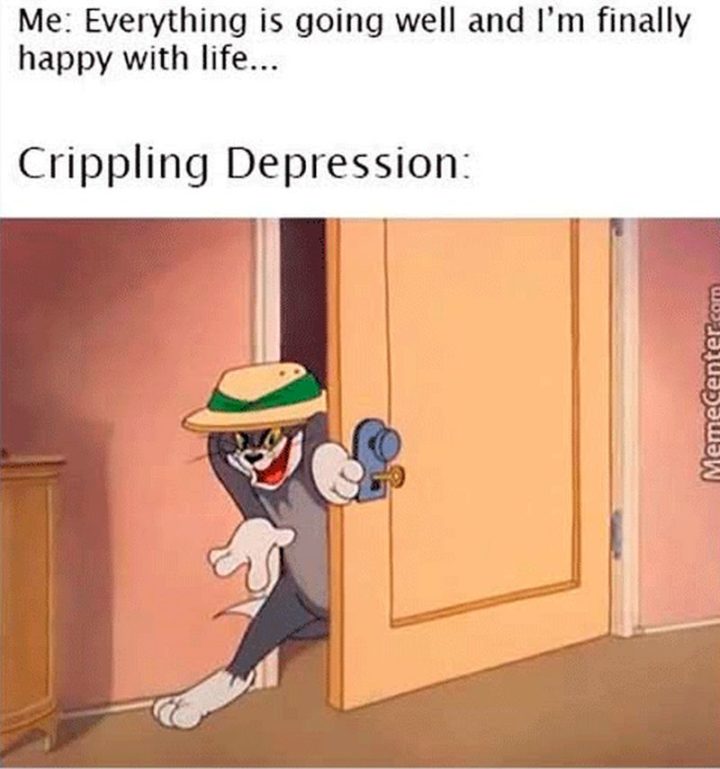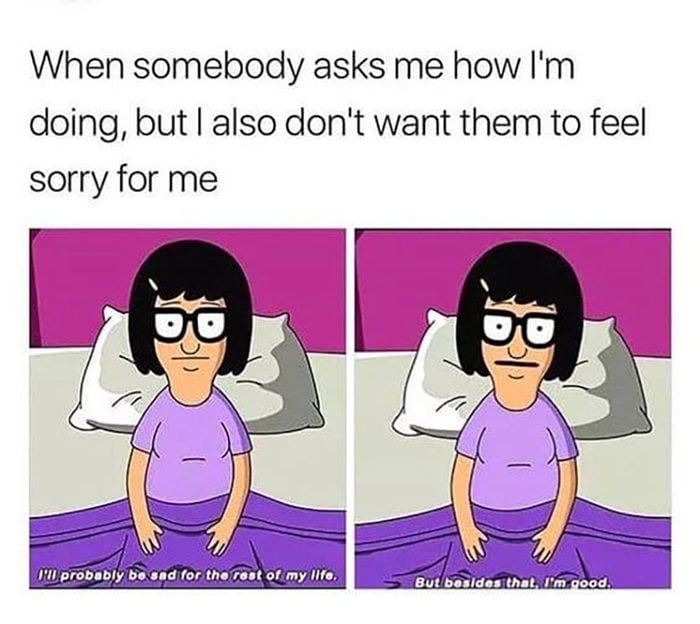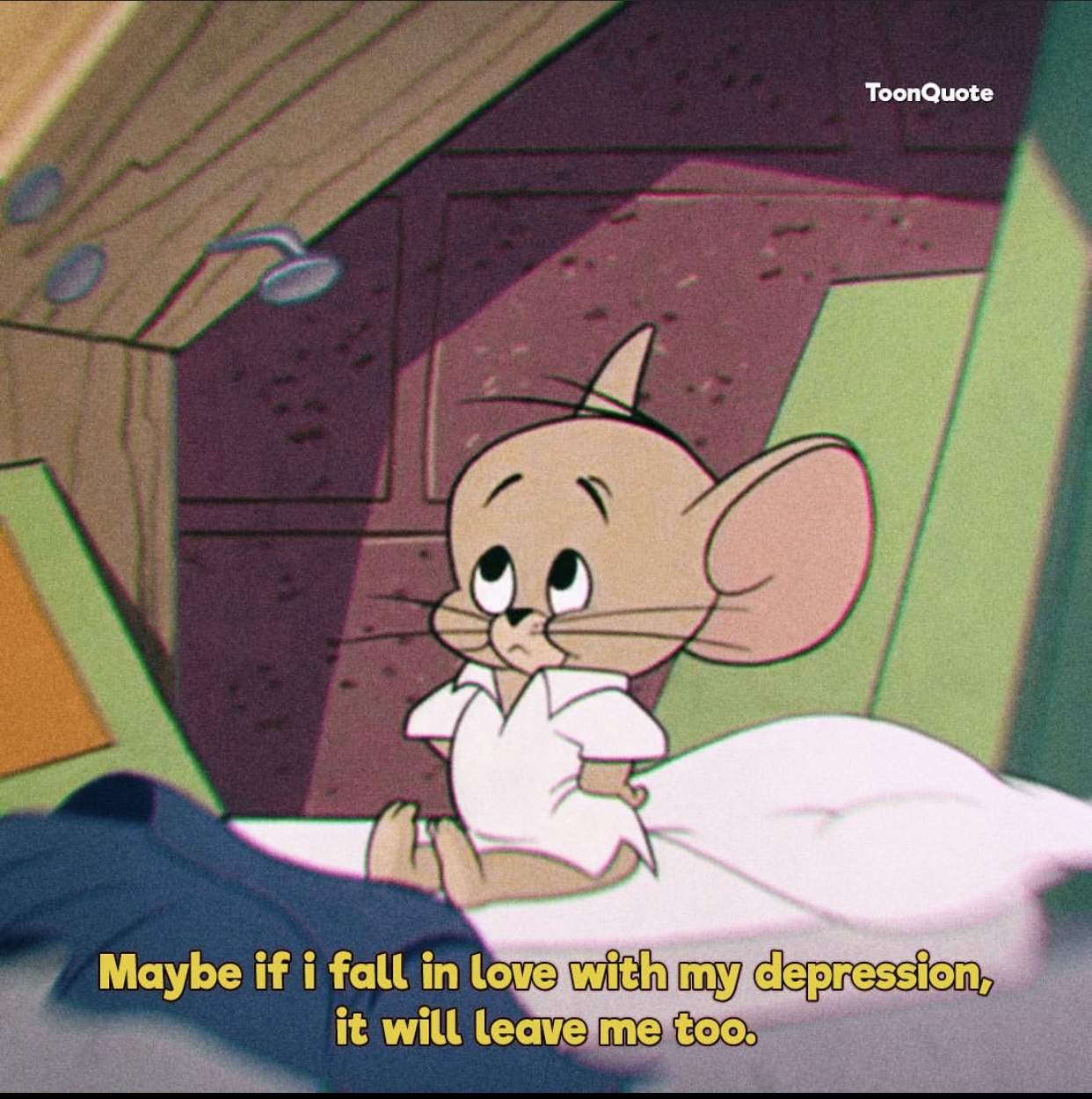Depression memes are everywhere these days, and while they might seem like just another form of internet humor, there's a lot more to them than meets the eye. They’ve become a cultural phenomenon, resonating with people who experience mental health struggles in ways that traditional media hasn’t been able to. These memes aren’t just jokes—they’re a lifeline, a way for individuals to express themselves and connect with others who truly understand what they’re going through. So grab your coffee, sit back, and let’s dive into the world of depression memes.
Now, you might be wondering why anyone would want to joke about something as serious as depression. It’s a valid question, but here’s the thing: humor has always been one of humanity’s most powerful coping mechanisms. When life gets heavy, people find ways to lighten the load, even if it means making light of their own struggles. And that’s exactly what depression memes do—they give people a space to laugh, cry, and maybe even heal together.
But don’t get me wrong, this isn’t all fun and games. Depression memes often carry a weight that can’t be ignored. They’re a reflection of real emotions, raw experiences, and the complexities of mental health. So buckle up, because we’re about to explore how these viral images have become a significant part of modern mental health discourse.
Read also:Ayah Khaled The Fascinating Journey Of Aya Khalaf
What Are Depression Memes?
Depression memes are a unique form of digital expression that combines humor with the realities of living with depression. They often take familiar meme formats—think "Distracted Boyfriend" or "Expanding Brain"—and fill them with content that speaks directly to the struggles of mental health. From jokes about therapy sessions to poking fun at the exhaustion of getting out of bed, these memes cover a wide range of topics related to depression.
These memes aren’t just random posts; they’re carefully crafted to resonate with people who understand the nuances of living with mental illness. They use sarcasm, irony, and sometimes dark humor to tackle subjects that are often difficult to talk about openly. And let’s be honest, sometimes laughing at your problems is the only way to keep from crying.
Why Do People Create Depression Memes?
Creating depression memes is more than just an exercise in creativity. For many, it’s a form of self-expression and a way to process their emotions. Here are a few reasons why people create these memes:
- Community Building: Depression memes help foster connections between individuals who may feel isolated by their mental health struggles.
- Validation: Seeing others share similar experiences can provide comfort and validation for those dealing with depression.
- Coping Mechanism: Humor is a powerful tool for managing stress and anxiety, and creating memes allows people to channel their emotions into something productive.
- Raising Awareness: By sharing their stories through memes, creators can help break down stigma surrounding mental health issues.
So yeah, there’s a lot more going on behind the scenes than just some guy typing "me when I haven’t showered in three days."
How Depression Memes Have Evolved Over Time
Depression memes didn’t just pop up overnight. Like any cultural trend, they’ve evolved over time, reflecting changes in societal attitudes toward mental health. In the early days, these memes were often simpler, focusing on basic themes like sadness or lethargy. But as awareness around mental health grew, so did the complexity of the memes themselves.
Today, depression memes cover a wide variety of topics, from medication side effects to navigating relationships while dealing with mental illness. This evolution mirrors the broader conversation around mental health, showing that people are becoming more comfortable discussing their struggles openly.
Read also:Yuka Saso The Rising Star In Golf Whorsquos Captivating The World
Key Moments in Depression Meme History
Here are a few milestones in the history of depression memes:
- The Rise of Reddit: Platforms like Reddit played a crucial role in popularizing depression memes, providing spaces where users could share and discuss their creations.
- Instagram and TikTok: As visual platforms gained popularity, depression memes became more visually engaging, incorporating animations and sound effects to enhance their impact.
- Mainstream Recognition: Celebrities and influencers began sharing depression memes, bringing them to a wider audience and helping to normalize discussions about mental health.
These moments highlight how depression memes have grown from niche internet humor to a mainstream cultural force.
The Psychology Behind Depression Memes
Understanding why depression memes resonate with so many people requires diving into the psychology of humor and mental health. Research shows that humor can play a critical role in coping with adversity, reducing stress levels, and improving overall well-being. Depression memes tap into this phenomenon, offering a safe outlet for people to express their emotions.
But it’s not just about laughing off the pain. These memes also serve as a form of social commentary, highlighting the absurdities of living with depression in a world that often misunderstands it. By framing difficult experiences through the lens of humor, creators can challenge stereotypes and promote empathy.
Benefits of Using Humor in Mental Health
Here are some benefits of using humor to address mental health issues:
- Emotional Release: Humor can help people process complex emotions, providing a sense of relief.
- Connection: Shared laughter fosters a sense of community and belonging among individuals with similar experiences.
- Empowerment: Creating or sharing depression memes can give people a sense of control over their narratives.
It’s important to note, however, that humor isn’t a cure-all. While depression memes can be helpful, they shouldn’t replace professional treatment or support.
Depression Memes and Stigma Reduction
One of the most significant impacts of depression memes is their role in reducing stigma surrounding mental health. By presenting mental illness in a relatable and accessible format, these memes help demystify conditions like depression, making them easier for others to understand. This increased understanding can lead to greater acceptance and support for those who are struggling.
Moreover, depression memes often highlight the everyday challenges of living with mental illness, showing that it’s not just about feeling sad all the time. Instead, it’s about navigating a complex web of emotions, behaviors, and external pressures. By sharing these realities, meme creators contribute to a more nuanced conversation about mental health.
Examples of Stigma-Busting Memes
Here are a few examples of depression memes that challenge common stereotypes:
- A meme showing the struggle of trying to explain depression to someone who doesn’t understand.
- A post poking fun at the unrealistic expectations society places on people with mental illness.
- An image illustrating the frustration of dealing with unsolicited advice from well-meaning friends.
These memes not only entertain but also educate, helping to bridge the gap between those who live with mental illness and those who don’t.
Controversies Surrounding Depression Memes
Of course, not everyone is a fan of depression memes. Some critics argue that they trivialize serious mental health issues, reducing them to punchlines. Others worry that these memes could discourage people from seeking help, implying that their struggles are just a joke.
While these concerns are valid, it’s worth noting that depression memes are just one part of the mental health conversation. They shouldn’t be seen as a replacement for professional support or therapy. Instead, they’re a tool—a way for people to connect, cope, and find meaning in their experiences.
Addressing Criticism
To address criticism, meme creators can:
- Be Mindful: Consider the potential impact of their content and avoid perpetuating harmful stereotypes.
- Encourage Dialogue: Use memes as a starting point for deeper conversations about mental health.
- Provide Resources: Include links to mental health resources or helplines in their posts.
By taking these steps, creators can ensure that their memes contribute positively to the mental health discourse.
Depression Memes in Popular Culture
Depression memes have made their way into mainstream pop culture, appearing in TV shows, movies, and even advertisements. This increased visibility reflects a growing acceptance of mental health topics in the public sphere. Shows like "BoJack Horseman" and "Euphoria" have incorporated meme-inspired humor into their storytelling, using it to explore complex themes related to mental illness.
Meanwhile, brands are starting to recognize the power of depression memes, incorporating them into marketing campaigns aimed at younger audiences. While this trend has sparked debate about commercialization, it also highlights the influence that these memes have on contemporary culture.
Famous Depiction of Depression Memes
Here are a few examples of depression memes in popular culture:
- A scene from "BoJack Horseman" where the character jokes about his inability to function without medication.
- A viral TikTok video featuring a user dancing to a song about therapy.
- An ad campaign for a mental health app that uses humor to break down barriers.
These examples show how depression memes are being embraced as a legitimate form of expression.
Creating Your Own Depression Memes
If you’re inspired to create your own depression memes, there are plenty of tools and resources available to help you get started. Apps like Canva and Adobe Spark offer easy-to-use design interfaces, while platforms like Reddit and Instagram provide endless inspiration for content ideas.
When creating your memes, remember to stay authentic and true to your experiences. Use humor as a way to connect with others, but don’t shy away from addressing the seriousness of mental health issues. And above all, have fun with it!
Tips for Creating Effective Memes
Here are a few tips for creating impactful depression memes:
- Know Your Audience: Tailor your content to the people you’re trying to reach.
- Stay Authentic: Share your genuine experiences and emotions.
- Use Visuals Wisely: Choose images that complement your message and enhance its impact.
By following these guidelines, you can create memes that resonate with others and contribute to the ongoing mental health conversation.
Conclusion
Depression memes have become an integral part of modern mental health discourse, offering a unique blend of humor and authenticity that resonates with millions of people worldwide. While they may seem like just another form of internet humor, these memes play a crucial role in reducing stigma, fostering connections, and promoting awareness.
So next time you come across a depression meme, take a moment to appreciate the thought and emotion behind it. And if you feel inspired, why not try creating your own? Who knows—you might just brighten someone’s day or help them feel a little less alone.
Before you go, I’d love to hear your thoughts on depression memes. Do you think they’re helpful, harmful, or somewhere in between? Leave a comment below, share this article with a friend, or check out some of our other posts on mental health. Together, we can keep the conversation going!
Table of Contents
- What Are Depression Memes?
- Why Do People Create Depression Memes?
- How Depression Memes Have Evolved Over Time
- The Psychology Behind Depression Memes
- Depression Memes and Stigma Reduction
- Controversies Surrounding Depression Memes
- Depression Memes in Popular Culture
- Creating Your Own Depression Memes
- Conclusion


